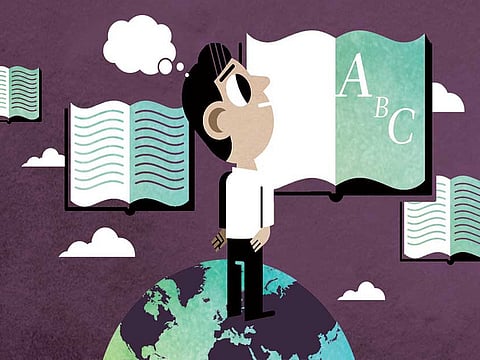Do thoughts need language?
If children grow up with the habit of reading, their language skills will increase and it will help them better express their views

We use language without thinking, but have you ever stopped to consider how we acquire our own mother tongue, and how we can continue enriching our ability to express ourselves?
The history of humanity has its roots embedded deep in the spread of languages. The Phoenicians brought the alphabet to the Greeks and literacy to the Europeans. The Sumerian language is one of the earliest known written languages, originating in Mesopotamia (modern day Iraq). English has grown from being spoken by a small number in southern England to becoming one of the world’s foremost global languages. The Arabic language is one of the six most spoken languages in the world, and also of immense importance for 1.8 billion Muslims across the globe.
Each person’s identity is intertwined with their language, especially their mother tongue, from even before birth. A baby spends nine months in its mother’s womb, picking up the rhythms and nuances of her words. I was fascinated to read that recent research has shown that babies in utero start learning language from their mothers from around 30 weeks of gestation. Newly born babies can differentiate between their mother’s language and a foreign language because they have been listening to speech patterns and unique sounds throughout that time, and are able to notice the differences within hours of birth.
While they have this extraordinary capacity to listen and learn, without a way of voicing their own needs or discomfort, babies can only cry, and mothers have to decipher what may be wrong. Quickly though, babies become toddlers, and start to use single words, then short sentences, until by the time a child starts school he or she should have a vocabulary of around 2,000 words. Many people describe with joy the moment their child learns to talk. I would add another wonderful milestone — when he or she learns to read.
Children from homes where books are available, and whose parents regularly read to them, have been shown to have larger vocabularies and a greater understanding of complex and abstract words. They also begin school with a head start over those little ones who have not been exposed to books and stories from a young age.
Is it too much to ask that we dedicate a little time every day to read to our youngsters? A daily habit of reading at a regular time, probably bedtime, will pass on a love of books, a stronger grasp of the language and the world of knowledge and creativity that can be found in the millions of books available.
If children grow up with the habit of reading regularly for pleasure, their language skills will increase, and they will be better able to voice their opinions and express their thoughts in writing. It has been statistically proven that these children will outperform their peers, at school, at university and in their careers, all else being equal, just because they were regular readers as children.
The question is, knowing as we do the real long-term benefits that reading bestows on children, how can we instil a love of books in our young ones?
Gadget-free zone
I believe it is our duty to make time every day to share books and stories, and to set an example by finding time to read ourselves. And we must continue to talk to our children about what interests and excites them, in books and in life.
Yes, we do lead hectic lives, and increasingly, we are bound up with electronic gadgets. Are we to be found sitting around a table, each person, even young children, lost in a virtual world, engrossed by what the screen displays, or checking out social media; all this rather than engage with real people surrounding us? Please think about this for a moment. You have it in your power to change it. Start today with declaring suppertime a gadget-free zone, enjoy your meal with loved ones, and encourage your children to think about and share something about their day.
This brings us back to how important language is in terms of our thought process. So much time is spent inside our heads, thinking things through. Those thoughts are formulated in language, and the more words we know the more we can accurately and effectively express our emotions, our awareness of the world around us, and our empathy for others. A mature way of thinking will allow us to make balanced decisions through our thought-making processes — something we must try to give our children as well as ourselves. Whether debating or disagreeing, a mastery of language will give us the edge, so I hope I have gone some way towards convincing you of the benefits of reading regularly.
If you need a little more inspiration, March is the UAE’s dedicated month of reading, and the Emirates Airline Festival of Literature runs till March 10, showcasing 180 authors from around the world talking about a vast range of topics and genres. I encourage you to come along with family and friends, discover new writers and join us for the largest celebration of Arab world’s spoken and written word.
Isobel Abulhoul, OBE, is CEO and trustee of the Emirates Literature Foundation and director of the Emirates Airline Festival of Literature.
Sign up for the Daily Briefing
Get the latest news and updates straight to your inbox


